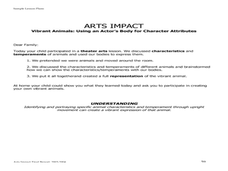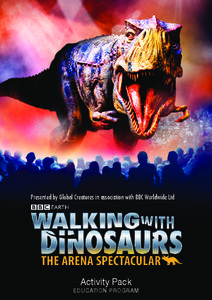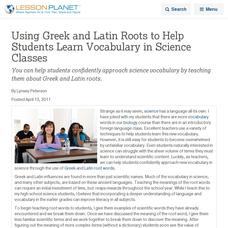Scholastic
Study Jams! The Kingdoms of Life
Life science learners discuss the characteristics of five kingdoms of life: animals, plants, fungi, protists, and bacteria in this video. Viewers find out from the dialogue that scientists group organisms according to similarities. This...
Curated OER
Vibrant Animals: Using an Actor's Body for Character Attributes
Students identify and portray specific character attributes through uprigth movement, creating a portrayal of an animal. They use vibrant, upright movement to convey the characteristics and temperament of specific animals. Finally,...
Curated OER
The Paper Nautilus
In this paper nautilus worksheet, students read for information and comprehension of text and vocabulary. In this short answer worksheet, students write seventeen answers.
Curated OER
Sand Dollars- Non-Fiction Comprehension Worksheet
In this sand dollar non-fiction reading comprehension worksheet, 5th graders read a 2 page selection about the life cycle and habitat of sand dollars. They use a dictionary and the article to define 10 words, and write the answer to 7...
Curated OER
Many Uses of Plants
Students research and discuss non-food plant products that are in common use, and mark on a world map the name of the country where the plant is grown.
BBC
Walking with Dinosaurs
Breath new life into your class's study of dinosaurs with this extensive collection of materials. Offering everything from a printable T-rex mask, word searches, and connect-the-dots activities to informational handouts, hands-on...
Curated OER
Guided Reading Organizer for Chain Reaction
The class uses Chain Reaction, a magazine, to build a better understanding of Latin and Greek roots found in scientific vocabulary. They use two attached worksheets to help them read a scientific article, using visual clues and their...
Curated OER
How Can We Keep Our Forests Intact and Have Our Chocolate Too?
Fourth graders explore various methods of growing and harvesting rainforest foods in order to sustain its biodiversity. They discuss the various uses for trees from several viewpoints. Students research chocolate demand and land use...
Curated OER
Making a Karst Dictionary
Pupils practice using the correct vocabulary in geology and hydrology. They use the Internet to research topics and practice their researching skills.
Curated OER
Bubbles
Students observe the characteristics of bubbles. In this scientific inquiry lesson, students use a bubble solution and a wand to make bubbles and observe their characteristics. Students identify the shape and the color of the bubbles.
Curated OER
I Wonder How the Manduca Life Cycle Compares To the Human Life Cycle...
Students study life cycles including developing their understanding of the human life cycle. They decide where they are in the human life cycle and provide reasons for that placement. They compare the human life cycle to that of the...
Curated OER
A Pill with a View
Learners brainstorm a list of potential uses for micro-video technologies. After reading an article, they analyze the development of a new pill-sized camera. In groups, they create a children's book that shows them the various systems of...
Curated OER
Colossal Squid Caught in Antarctic
Students define the word colossal, then read a news article about an enormous squid caught off Antarctica. In this animal studies and current events lesson plan, the teacher introduces the article with dictionary and vocabulary...
Curated OER
Substance Use, or Abuse?
Students identify the medicinal benefits, and ill effects, of a variety of controlled substances. They determine whether or not they think hallucinogens should be researched for possible medicinal purposes.
Curated OER
Using Greek and Latin Roots to Help Students Learn Vocabulary in Science Classes
You can help students confidently approach science vocabulary by teaching them about Greek and Latin roots.
Curated OER
Ecuadorian Rainforest
Have your class talk about the importance of the rainforest and the products that come from it. Learners watch a video showing the path of chocolate from the rainforest to the supermarket. They discuss how the rainforest and...
Curated OER
Can Scientists Discover a Limit to Discovery?
Is there anything left to discover? Evaluate opposing sides of the debate regarding whether or not there is a future for scientific discovery. Middle and high schoolers assess quotations from the articles included to evaluate claims and...
Curated OER
Exploring Arizona's Biotic Communities Lesson 2: Biotic Communities Vocabulary
Part of a unit on Arizona's biotic communities, this instructional activity focuses on the vocabulary to be used. Terms include biodiversity, topography, desert, hybridization, niche, and more! Youngsters will define these words from...
Curated OER
ABC and 1-2-3 Farming
Students demonstrate how to alphabetize animal names. In this word study lesson, students identify animals that live on the farm and conduct a favorite farm animal survey. Students order animal pictures in alphabetical order.
Curated OER
Become an Expert
Students are assigned a separate species of plant or bird to research. Using a worksheet, they are responsible for finding a variety of information on their assigned plant or bird. They also complete a mini-poster and give an oral...
Shodor Education Foundation
Rabbits and Wolves
A change in a parameter can end in overpopulation. The resources gives pupils the opportunity to control the parameters of rabbits and wolves in a natural setting. Using the set parameters, the simulation runs and displays the population...
Curated OER
Land Use Issues
For this unit of lessons, students examine analogies and parts of speech. They use land use issues to identify the different parts of speech that they research. They create analogies about the origin of organisms.
Curated OER
Shadow Trackers
Learners use online websites to inquire about the cycle of day and night. In this web based instructional activity, students are able to see the movement of the sun and Earth. Learners can look at different parts of the Earth as if they...
Curated OER
WHALES: GIANTS OF THE DEEP
Students study humpback whale migrations, feeding, social organization, population, scientific investigations and compare humpback whales , research to explore a specific type of whale, and create their own replica of a whale.























